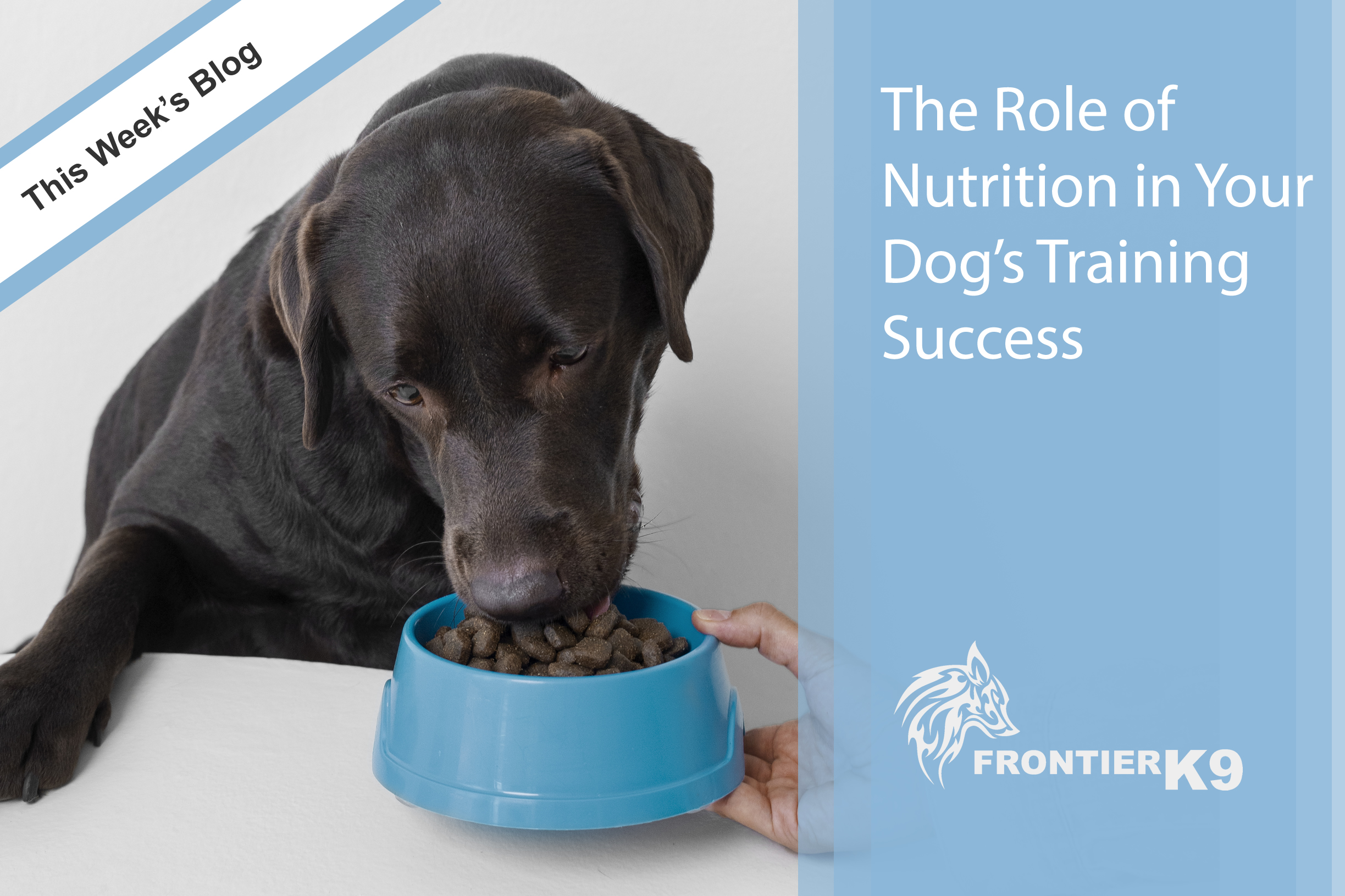Our Latest Frontier K9 Blog – Nutrition in Your Dog’s Training Success
Hello and welcome to our latest blog post. We are excited to share this with you today because it’s a topic of great importance.
When it comes to training your dog, many factors contribute to success: consistency, positive reinforcement, patience, and, often overlooked, nutrition. Just like in humans, what your dog eats can have a profound impact on their ability to learn and perform. At Frontier K9 Services, we understand that a well-balanced diet is crucial for your dog’s overall health and training success. Here’s why nutrition is a key player in your dog’s training journey.
1. Energy Levels and Stamina
Training sessions require your dog to have sufficient energy and stamina. A balanced diet rich in high-quality proteins, healthy fats, and carbohydrates provides the fuel they need to stay active and engaged. Proteins support muscle development and repair, fats provide long-lasting energy, and carbohydrates offer quick bursts of energy essential for short, intense training activities.
2. Brain Health and Cognitive Function
The brain is a highly metabolic organ, meaning it consumes a significant amount of energy. Nutrients such as omega-3 fatty acids, particularly DHA (docosahexaenoic acid), are essential for brain health and cognitive function. Foods rich in omega-3s, like fish oils and flaxseed, can enhance your dog’s ability to learn new commands and tricks. Antioxidants, found in fruits and vegetables, also play a role in protecting the brain from oxidative stress, promoting better cognitive performance.
3. Mood and Behaviour
Nutrition can directly affect your dog’s mood and behaviour. Dogs that consume a balanced diet with the right nutrients are less likely to exhibit behavioral problems such as hyperactivity, aggression, or anxiety. For example, tryptophan, an amino acid found in turkey, can help produce serotonin, a neurotransmitter that contributes to feelings of well-being and calmness. A calm, happy dog is more likely to be focused and receptive during training sessions.
4. Digestive Health
A healthy digestive system is crucial for your dog’s overall well-being. High-quality dog food that includes fiber, probiotics, and prebiotics supports a healthy gut, ensuring that nutrients are effectively absorbed. When your dog’s digestive system is functioning optimally, they are less likely to experience discomfort or distractions during training. Regular and firm stools are a good indicator of proper digestion, which can make house training easier as well.
5. Skin and Coat Health
A shiny coat and healthy skin are indicators of good nutrition. Foods rich in essential fatty acids, vitamins, and minerals contribute to a glossy coat and healthy skin, reducing the likelihood of irritations or allergies that could distract your dog during training. Ingredients like salmon, flaxseed, and sweet potatoes are excellent choices for maintaining skin and coat health.
6. Weight Management
Maintaining a healthy weight is crucial for your dog’s agility and overall health. Obesity can lead to a range of health issues, including joint problems, which can impede your dog’s ability to participate in training activities. A balanced diet with appropriate portion control helps keep your dog at a healthy weight, ensuring they can move freely and comfortably during training sessions.
7. Hydration
Proper hydration is just as important as nutrition. Ensure your dog has access to fresh water at all times, especially during and after training sessions. Dehydration can lead to lethargy, reduced concentration, and overall poor performance.
Tips for Choosing the Right Food
- Consult Your Veterinarian: Before making any changes to your dog’s diet, consult with your veterinarian. They can provide recommendations based on your dog’s specific needs, age, breed, and health status.
- Read Labels Carefully: Look for dog foods that list high-quality protein sources as the first ingredient. Avoid foods with excessive fillers, artificial preservatives, and by-products.
- Consider Special Needs: Some dogs have specific dietary requirements due to allergies, sensitivities, or health conditions. Choose a diet that caters to these special needs.
- Monitor and Adjust: Observe your dog’s performance and health. If you notice any changes in their behaviour, energy levels, or physical condition, it might be time to re-evaluate their diet.
Conclusion
The role of nutrition in your dog’s training success cannot be overstated. A balanced diet supports your dog’s physical health, cognitive function, and overall well-being, making training sessions more productive and enjoyable. At Frontier K9 Services, we believe that combining proper nutrition with expert training techniques is the key to raising a well-behaved, happy dog. Invest in your dog’s diet, and you’ll see the benefits reflected in their training success.


